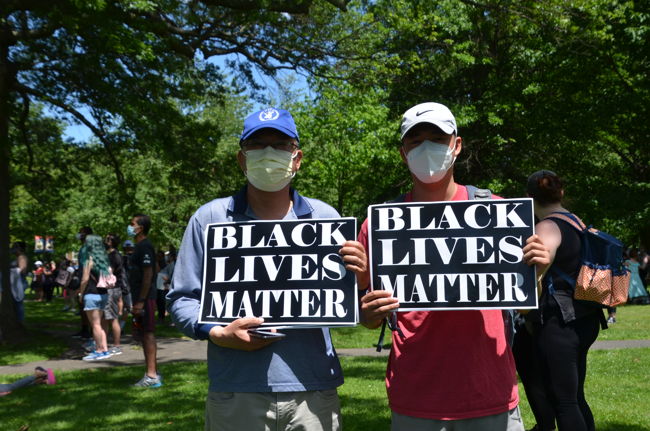Al celebrar el Mes de la Historia Negra, me siento honrado de informar que me han invitado a participar en el Proyecto de Historia Oral de “Power Politics” en Scribe Video Center. El proyecto tiene como objetivo explorar estrategias para el empoderamiento político de los negros en la ciudad de Filadelfia entre 1945 y 2015. «¿Por qué te invitaron, si no eres negro?»; algunos de ustedes pueden preguntar. Permítanme recordarles a quienes me conocen bien, que la piel de la madre que me crio desde la infancia hasta la adultez era oscura, la piel de su padre era negra oscura, su esposa, la piel de mi bisabuela era blanca y la madre que me dio a luz era blanca con el pelo rojo/castaño, sin embargo, todos somos puertorriqueños (as).
Al crecer, me inspiré en Martin Luther King, Jr., Malcolm X, Huey Newton, Harriett Tubman y los habitantes de Filadelfia: Muhamad Kenyatta, el representante estatal David Richardson, el reverendo Leon Sullivan, C. Delores Tucker, todos gigantes de la lucha afroamericana por justicia e igualdad. Si bien tiene razón al decir que no soy lo que se conoce como afroamericano, el movimiento de derechos civiles de los Estados Unidos, aunque está arraigado en la comunidad negra, tocó una fibra sensible en mí como un vehículo para el acceso igualitario a la justicia y la igualdad para todos. Las tácticas utilizadas por el poder negro y el movimiento por los derechos civiles me intrigaron cuando era niño en la década de 1970.
Estos movimientos reunieron a muchos jóvenes puertorriqueños criados en los Estados Unidos, quienes compartimos vecindarios y experiencias de pobreza y privación. Estos jóvenes hablábamos principalmente inglés, y con nuestra arrogancia, retórica y vestimenta, reconocimos con orgullo y abiertamente las influencias de la comunidad negra y su movimiento por el cambio.
Sabíamos que no éramos afroamericanos, al igual que ellos. Aun así, una cosa es segura; las dos comunidades comparten experiencias similares: discriminación en vivienda, empleo, atención médica, educación, desarrollo económico, política, justicia penal y el sistema de creencias culturales de la sociedad blanca, referente a los mitos, símbolos, vocabulario y creencias dominantes sobre las personas negras y latinas que define la conciencia de nuestra nación.
Me siento profundamente honrado de recibir esta oportunidad de contribuir con mi trabajo a la comunidad negra, en algo tan importante como este proyecto, financiado por la Commonwealth of Pennsylvania. Es muy especial que algunas de las entrevistas sobre mí se transmitan en las estaciones de radio de Filadelfia y se hagan accesibles en varios programas educativos. Es una lección de humildad recibir la invitación con jóvenes estudiantes de secundaria que realizan las entrevistas con tantos líderes, realmente gigantes, del movimiento de empoderamiento negro. Me gustaría reconocer a cinco personas en particular, que han sido una inspiración duradera para mí, en mi lucha por un cambio positivo, proporcionando siempre equidad y equilibrio en los medios: Barbara Grant, Karen Warrington, Linn Washington, Louis Massiah y Ramiyah Wilson, una estudiante de la escuela superior, Walter B. Saul.
We share the same fight

As we celebrate Black History Month, I am honored to report that I have been invited to participate in the Power Politics Oral History Project at Scribe Video Center. The goal of the project is to explore strategies for Black political empowerment in the City of Philadelphia between 1945 -2015. “Why are you being featured, you aren’t Black?”; some of you may ask. Let me remind those who know me well, that the mother who raised me from infancy to adulthood skin was dark brown, her father’s skin was dark black, his wife, my great grandmother’s skin was white, and the mother who gave birth to me was white with auburn hair, yet we are all Puertorriqueños (as).
Growing up, I was inspired by Martin Luther King, Jr., Malcolm X, Huey Newton, Harriett Tubman, and Philadelphians: Muhamad Kenyatta, State Representative David Richardson, Reverend Leon Sullivan, C. Delores Tucker, all giants of the African American struggle for justice and equality.
While you are right in saying that I am not African American, the United States civil rights movement, while rooted in the African American community, struck a broad responsive chord with me as a vehicle for equal access to justice and equality for all. The tactics used by the Black power and civil rights movement intrigued me as a child growing up in the 1970s. These movements brought together many Puerto Rican youth raised in the United States, sharing neighborhoods and experiences of poverty and deprivation. These youth spoke English, in our swagger, rhetoric and dress, and we proudly and openly acknowledged the influences of the Black community and movement for change. We knew we were not African Americans and so did the African Americans, but one thing is certain, the two communities shared similar experiences— discrimination in housing, employment, health care, education, economic development, politics. criminal justice, and White society’s cultural belief system in the dominant myths, symbols, vocabulary, and beliefs about Black and Latino people which defines the consciousness of our nation.
I am deeply honored to receive this opportunity to contribute to my work with the African American community on something as important as this project, funded by the Commonwealth of Pennsylvania. Having some of the interviews broadcasted on Philadelphia radio stations and made accessible in various educational programs made about me, is very special. It is humbling to receive the invitation with young high school students conducting the interviews with so many leaders, really giants, of the Black empowerment movement. I would like to recognize five people who have been an enduring inspiration to me in the fight for positive change by always providing fairness and balance in the media: Barbara Grant, Karen Warrington, Linn Washington, Louis Massiah and Walter B. Saul High School student, Ramiyah Wilson.







